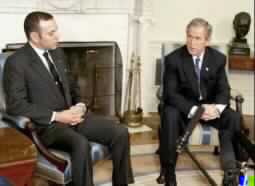- Author:
& News Agencies - Section:
WORLD HEADLINES
Arab American Relations Tested to Limits

HIGHLIGHTS: Bush Met Moroccan Monarch Tuesday & is to Meet Saudi Crown Prince Thursday.
Egyptian Embassy Pelted with Stones in Damascus.
Cairo And Amman Pledge Strong Support to Palestinians But Would not Go To Battle with Israel.
STORYAmerica's war on so-called terror and Israel's brutal war against the Palestinians is testing American-Arab relations to the very limits. American lobby groups are openly questioning long warm relations with Saudi Arabia and are urging the White House to review these relations while street demonstrators in Arab capitals have demanding that Egypt and Jordan sever relations with Israel and with Washington if needs be.
BUSH PRESSES FOR PALESTINIAN STATE
Reaching out to the Arab world, President George W. Bush on Tuesday said that lasting peace in the Middle East is possible only if a Palestinian state is established.
Underscoring his message, Bush said, "our government means what we say."
He spoke to reporters during a break in talks with King Mohammed VI of Morocco for a picture-taking session.
The king, urging a more vigorous U.S. role, said, "We have to shift the gear to go into higher speed." He also pledged Morocco's support in the U.S.-led campaign against terrorism.
On Thursday, Bush will receive Crown Prince Abdullah of Saudi Arabia, whose proposal for a settlement between Israel and the Arabs already has been embraced by the president.
Abdullah is bolstered in his talks with Bush on Thursday by the Arab League's acceptance last month of the prince's peace initiative, which offers Israel normal ties and security in return for Arab territory lost in 1967, recognition of a Palestinian state and a solution to the refugee question.
EGYPT & JORDAN UNDER PRESSURE
Street protests have been taking place across the Arab world since Israeli troops swept into Palestinian towns last month in pursuit of Palestinian militants.
In Jordan and Egypt, the only Arab countries to make peace with Israel, demonstrators have called on their governments to annul those treaties and break diplomatic ties. Syrians have pelted Egypt's embassy in Damascus with stones and Yemenis have marched on Egypt's embassy in San'a to protest what they see as Egypt's insufficiently pro-Palestinian stance.
The calls are not coming just from the streets. Libyan leader Moammar Gadhafi called on fellow Arabs to scrap the Saudi peace initiative and fight alongside the Palestinians. Gadhafi also scoffed at an announcement from Egypt earlier this month that it was limiting relations with Israel to diplomatic contacts that could help the Palestinians.
Egyptian President Hosni Mubarak has ridiculed calls for war, while expressing frustration with Israeli Prime Minister Ariel Sharon and reservations about Sharon's calls for a new international peace summit.
Jordan's King Abdullah II says he understands the emotion driving the protests that have swept his kingdom - so much so he has said he is ready to join the marches himself. But he also says there will be no change in Jordan's diplomatic ties with Israel. Like Mubarak, he says ties are necessary to influence Israeli policy and help the Palestinians achieve their political rights.
Because of their peace treaties with Israel, Jordan and Egypt get U.S. aid and international prestige, benefits they do not want to sacrifice.
PHOTO CAPTION:
President Bush meets, Tuesday, April 23, 2002, in the Oval Office with King Mohammed VI of Morocco, left. He thanked Bush for sending Secretary of State Colin Powell to the region two weeks ago and said ``we are beginning to see the results,'' an apparent reference to Israel's pulling back its forces of occupation from the West Bank. (AP Photo/Ron Edmon
Related Articles
 Prayer Times
Prayer Times
 Prayer times for Doha, Qatar Other?
Prayer times for Doha, Qatar Other?
-
Fajr
04:56 AM -
Dhuhr
11:37 AM -
Asr
02:36 PM -
Maghrib
04:55 PM -
Isha
06:25 PM


 Home
Home Discover Islam
Discover Islam Quran Recitations
Quran Recitations Lectures
Lectures
 Fatwa
Fatwa Articles
Articles Fiqh
Fiqh E-Books
E-Books Boys & Girls
Boys & Girls  Ramadan
Ramadan Fatwa Audios
Fatwa Audios Month of Mercy
Month of Mercy Women
Women Eed Al- Fitr
Eed Al- Fitr Food Recipes
Food Recipes Videos
Videos













